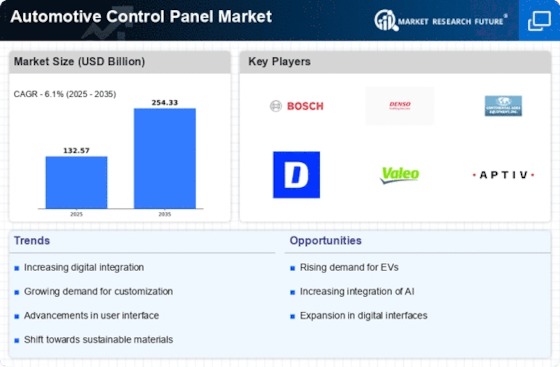Top Industry Leaders in the Automotive Control Panel Market
*Disclaimer: List of key companies in no particular order
The automotive control panel market stands as a pivotal segment within the automotive industry, functioning to provide drivers access to various vehicle functions. Fueled by the surge in demand for comfort and convenience features, the integration of advanced driver-assistance systems (ADAS), and the rapid shift towards electric vehicles (EVs), the market growth presents enticing prospects for industry participants. Simultaneously, this growth intensifies the competitive landscape as both established and emerging players vie for a larger market share.
Strategies Employed by Key Players:
Product Diversification: Major players like Continental, Johnson Controls International, and Faurecia are expanding their product portfolios beyond conventional physical buttons and knobs. They introduce touchscreens, voice-activated controls, and gesture recognition technologies, aligning with evolving consumer preferences akin to those experienced with smartphone interfaces. The image provided portrays a touch screen control panel, aligning with this trend.
Technological Advancements: Continuous research and development are paramount for maintaining a competitive edge in this rapidly evolving market. Companies such as Aptiv and Visteon heavily invest in R&D to enhance the responsiveness, accuracy, and security of touchscreens and voice recognition systems. Additionally, they explore augmented reality (AR) and head-up displays (HUDs) to seamlessly integrate information and controls into the driver's field of view.
Material Innovation: Materials utilized in control panels significantly impact their aesthetics, functionality, and durability. Players like Yanfeng Automotive Interiors concentrate on crafting lightweight, scratch-resistant, and fingerprint-proof materials to enrich the user experience and appeal to environmentally conscious consumers.
Customization and Personalization: In response to the surging demand for personalization, companies such as Lear Corporation offer customizable control panels with various color schemes, layouts, and functionalities. This empowers automakers to distinguish their vehicles and cater to diverse customer segments' specific needs and preferences.
Factors Influencing Market Share:
Product Innovation and Quality: Companies with a history of delivering innovative and high-quality control panels secure the trust and preference of automakers. The ability to seamlessly integrate new technologies like touchscreens and voice recognition while ensuring user-friendliness and intuitiveness remains a critical differentiator.
Cost-Effectiveness: While advanced features are desirable, cost remains a pivotal factor, especially in budget-sensitive segments. Players capable of developing cost-competitive solutions without compromising on quality or functionality hold a strategic advantage.
Regional Focus: Specific control panel features and technologies are in varying demand across different regions. North America and Europe exhibit a higher demand for ADAS functionalities, while the Asia Pacific region emphasizes more on comfort and convenience features. Players with a robust regional presence and a nuanced understanding of local regulations and preferences have a competitive edge.
Vertical Integration: Some players opt for vertical integration to exert greater control over the supply chain and ensure quality. This could involve in-house manufacturing of key components like touchscreens and displays or forming close partnerships with suppliers to streamline the production process.
Emerging Trends in the Market:
Haptic Feedback and Gesture Recognition: Integrating haptic feedback into control panels offers physical confirmation of user actions, enhancing the feeling of control and reducing the need to divert attention from the road. Gesture recognition technologies provide a contactless and potentially more intuitive means of interacting with the control panel.
Multi-Modal Interaction: The fusion of touchscreens, voice commands, and physical buttons offers drivers more flexibility and redundancy in controlling their vehicles. This accommodates different user preferences and proves beneficial in scenarios where visibility or touch accuracy might be compromised.
Cybersecurity: As vehicles become more connected, ensuring the cybersecurity of control panels becomes paramount. Players focus on developing secure software and hardware solutions to prevent hacking and unauthorized access to vehicle systems.
Competitive Scenario Overview:
The automotive control panel market is a dynamic and highly competitive arena with substantial growth prospects. Established players boasting technological expertise, comprehensive product portfolios, and global reach are strategically positioned to capitalize on this growth. However, the constant emergence of new technologies, players, and applications continues to reshape the competitive landscape. The players who swiftly adapt, embrace innovation, and develop cost-effective solutions tailored to specific needs and regional preferences will secure a lasting competitive advantage in this dynamic market.
Recent Industry Developments:
Faurecia S.A.:
-
December 15, 2023: Unveiled a new Human Machine Interface (HMI) concept featuring a customizable, voice-activated control panel integrating various vehicle functions.
Hyundai Mobis Co., Ltd.:
-
December 7, 2023: Announced plans to invest $1 billion in developing next-generation automotive electronics, including smart control panels with AI capabilities.
Calsonic Kansei Corporation:
-
October 26, 2023: Unveiled a new line of ergonomic control panels designed to enhance driver comfort and reduce fatigue.
Lear Corporation:
-
September 21, 2023: Invested in a new manufacturing facility for advanced control panels featuring touchscreens and voice recognition technology.
Continental AG:
-
August 10, 2023: Partnered with a leading tech company to develop a cloud-based platform for connected car control panels, enabling remote software updates and personalized experiences.
Top Companies in the Automotive Control Panel Industry:
- Magna International Inc.
- Faurecia S.A.
- Hyundai Mobis Co., Ltd.
- Toyota Boshoku Corporation
- Calsonic Kansei Corporation
- Lear Corporation
- Continental AG
- Johnson Controls, Inc.
- Delphi Automotive PLC.
- Valeo SA
- TATA Motors
- Renault
- Ford Motor Company
- Navistar Inc
- Groupe PSA
- And others










